Mahatma Gandhi Was ‘A Racist’ Who Looked Down On Africans?
One of the most revered and revolutionary leaders in world history, Mohandas Karamchand Gandhi comes sharply under the microscope in an upcoming controversial book authored by South African academics.
Ashwin Desai and Goolam Vahed spent seven years investigating the 21 year period Gandhi spent as a young lawyer in South Africa fighting for the rights of Indians there.
The fruits of that labour, ‘The South African Gandhi: Stretcher-Bearer of Empire’, argues that despite later gaining iconic status, the young Gandhi kept his struggle for his people (the Indians) separate from that for blacks. The authors argue that he looked down on the blacks just as much as any white person did, and often used derogatory terms towards them.
Desai and Vahed write Gandhi kept the Indian struggle “separate from that of Africans and coloureds even though the latter were also denied political rights on the basis of colour and could also lay claim to being British subjects”.
So what is the case for the great Mahatma Gandhi being a racist? Desai and Vahed catalogue it throughout their book, and the BBC’s Soutik Biswas list them in this piece.
In 1893, Gandhi wrote to the Natal parliament saying that a “general belief seems to prevail in the Colony that the Indians are a little better, if at all, than savages or the Natives of Africa”.
In 1904, he wrote to a health officer in Johannesburg that the council “must withdraw Kaffirs” from an unsanitary slum called the “Coolie Location” where a large number of Africans lived alongside Indians. “About the mixing of the Kaffirs with the Indians, I must confess I feel most strongly.”
The same year he wrote that unlike the African, the Indian had no “war-dances, nor does he drink Kaffir beer”. When Durban was hit by a plague in 1905, Gandhi wrote that the problem would persist as long as Indians and Africans were being “herded together indiscriminately at the hospital”.
The case for Gandhi is made by his biographer and grandson Rajmohan Gandhi. According to him whilst it’s undeniable Gandhi had a less than stellar attitude towards the blacks of that time, his “struggle for Indian rights in South Africa paved the way for the struggle of black rights” and that “he was more radical and progressive than most contemporary compatriots”.
That argument, of course, can be made for anyone. America’s founding founders believed that all men were created equal and endowed with certain inalienable rights, yet owned slaves.The question is, can we of the 21st century, with the power of hindsight; judge those who came before us and lived in a system that saw nothing wrong with those acts. Can someone be more than the product of their nuture?
Numerous civil rights leaders, who sprung up at several points in history, including Gandhi himself, show that some people can arise above the moral blindness of their age. And Gandhi’s own fight to save his people from the atrocities of British rule show he could see the big picture. Rajmohan’s defence of his grandfather is noble, and understandable; but still not exonerating.
Desai, one of the co-authors, not surprisingly, absolutely disagrees. He told the BBC’s Biswas that Gandhi believed in ‘white power’
“Gandhi believed in the Aryan brotherhood. This involved whites and Indians higher up than Africans on the civilised scale. To that extent he was a racist. To the extent that he wrote Africans out of history or was keen to join with whites in their subjugation he was a racist.
“To the extent that he accepted white minority power but was keen to be a junior partner, he was a racist. You cannot have Gandhi as an accomplice of colonial subjugation in South Africa and then also defend his liberation credentials in South Africa.”
Which seems to be the point of the whole book. Some historians like to argue that Gandhi’s work paved the way for the later struggle of black South Africa for their own freedom. Desai and Vahed’s intention is to erase that erroneous impression.
To say that Gandhi’s struggle paved the way, “you are writing out the history of African resistance to colonialism that unfolded much before Gandhi even arrived” was how Desai put it.
Which irrespective of whether he was racist or not; must not be countenanced. The man Ghandi became later in life was indeed great, and he had already set down the path of leadership when he got into South Africa; but that does not mean he was always a perfect man.
Probably the point his grandson was trying to get across, but with maybe a little less hyperbole.






